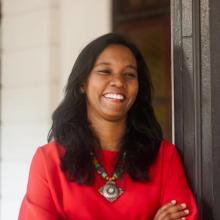Dinesha Samararatne
Senior Fellow, Melbourne Law School, University of Melbourne, Australia
Senior, Lecturer, Department of Public & International Law, Faculty of Law, University of Colombo, Sri Lanka


Senior Fellow, Melbourne Law School, University of Melbourne, Australia
Senior, Lecturer, Department of Public & International Law, Faculty of Law, University of Colombo, Sri Lanka
Dinesha Samararatne is a Professor at the Department of Public & International Law at the Faculty of Law of the University of Colombo, Sri Lanka. Her research interests include judicial review, public participation in constitution-making, constitutional resilience, women and constitutional law, fourth branch institutions and the relevance of the global south in comparative constitutional law. Dinesha has published widely. Dinesha is a Senior Fellow and Co-Convenor of Constitution Transformation Network (CTN) of the Melbourne Law School, Australia. She is a member of the Editorial Board of the Indian Law Review. In 2023 she was appointed as an independent expert to the Constitutional Council of Sri Lanka. Dinesha is a LLB graduate from the University of Colombo and an Attorney-at-Law. She read for her Master’s degree as a Fulbright Scholar at Harvard Law School, MA, USA and she completed her doctoral studies at the University of Colombo. Dinesha has previously been affiliated with the Centre on Comparative Constitutional Law as a Kathleen Fitzpatrick Visiting Fellow (April – May 2018) and as a Postdoctoral Fellow (2019 - 2020).